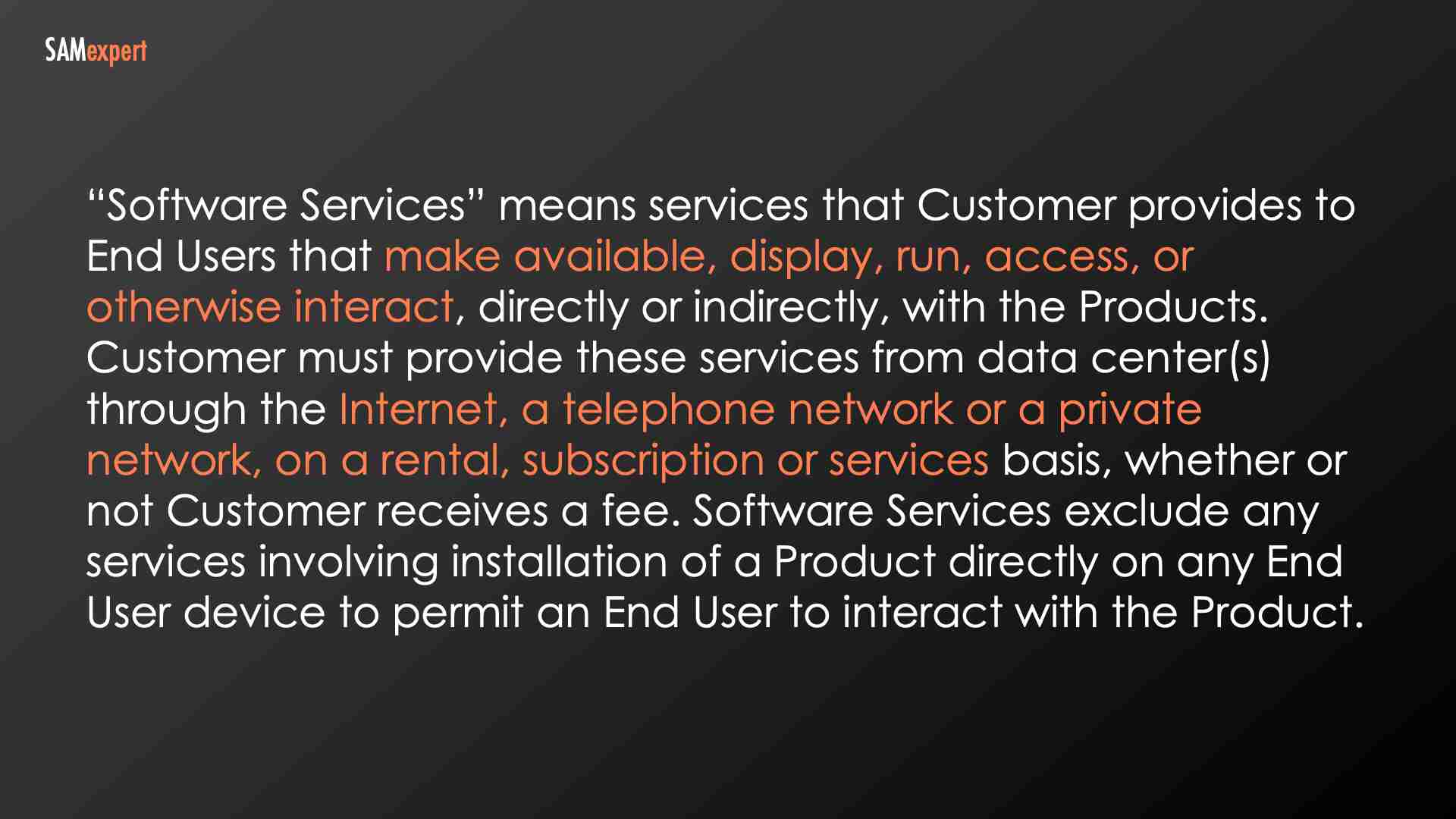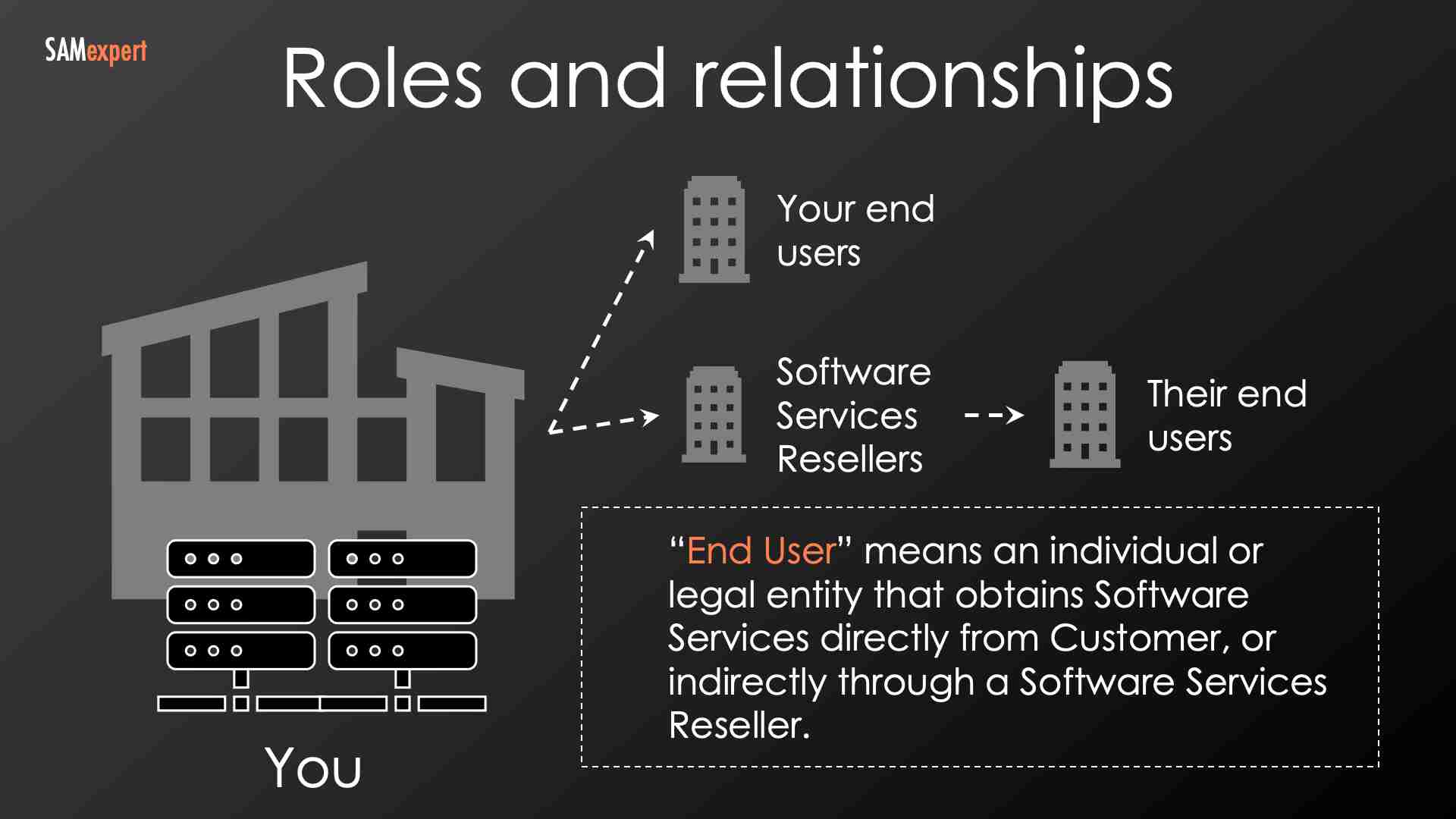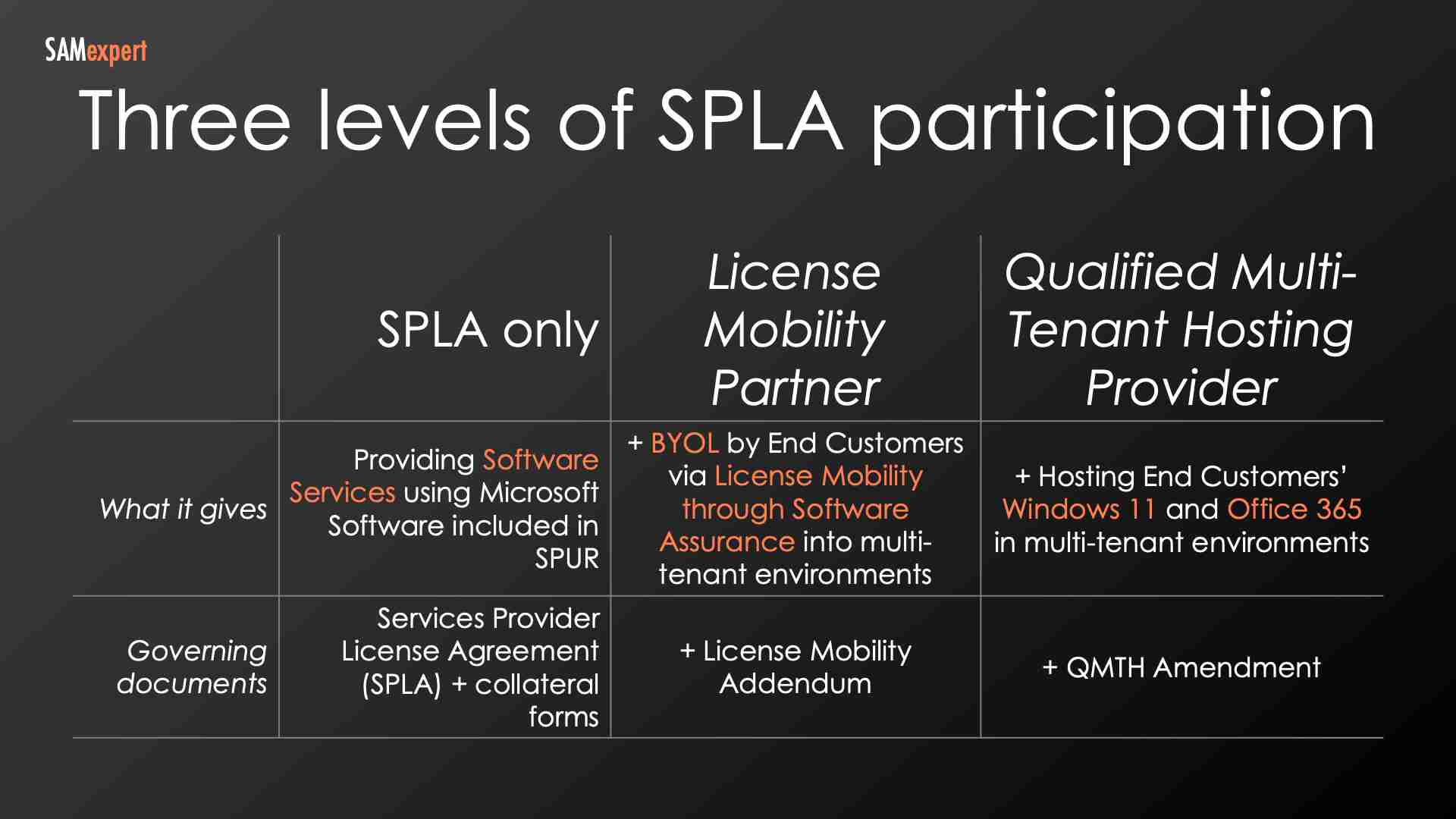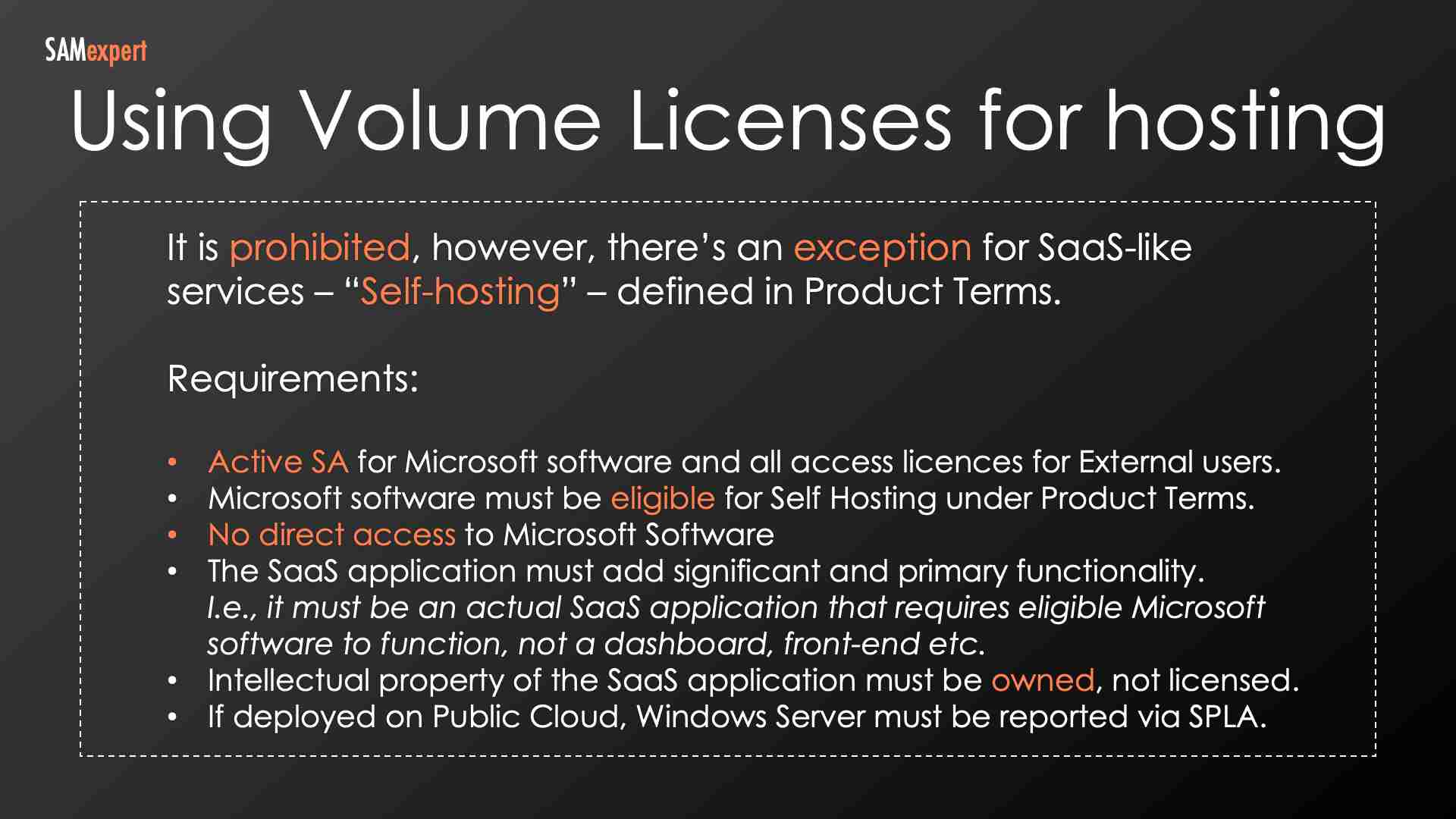Summary
Microsoft SPLA (Services Provider License Agreement) is a licensing program for service providers and independent software vendors. It allows them to license Microsoft software to host and deliver their applications.
Let's break it down and explain everything you need to know.
We'll start by discussing Microsoft SPLA and how it works. Then, we'll look at its benefits for both providers and end-users. We'll review the licensing options and models. Finally, we'll answer some common SPLA licensing questions.
This article is a guide for both service providers and their customers. It is constantly updated to reflect the latest changes.
So, what is Microsoft SPLA?
It's a licensing program that lets service providers use Microsoft software for hosting. SaaS vendors can use it to deliver their applications running on Microsoft servers.
With SPLA, you can offer Microsoft products in a pay-as-you-go model. Your customers can pay monthly for the use of the software. And there is no need to buy licenses upfront.
What is a SPLA license?
Service providers use Microsoft SPLA licenses to provide hosting and other commercial services. From the licensing point of view, the provider is the licensee. The licensing agreement is between the provider and Microsoft. End customers rent services from the provider and pay service fees.
No traditional "entitlement"
When you license software for internal use, you must buy the necessary licenses first. But SPLA has no quantifiable "entitlement".
Providers may deploy as many instances as needed to provide services. They may also create as many user accounts as required. Then, at the end of each calendar month, providers must report the high watermark to Microsoft. They do it via their SPLA resellers.
End-user licensing terms
The provider is the principal licensee. However, end customers also have licensing obligations.
SPLA terms require providers to sign an agreement with each end customer. Even when services are procured online, for example, on AWS or Azure, there is a public offer that end customers must accept.
Although there's no end-user "entitlement" in the traditional meaning, there are still licensing terms and conditions for end customers.
Do I need SPLA?
If you are a provider or independent software vendor with a SaaS solution, there is little choice when you need Microsoft software for hosting. This is especially true in a shared hosting environment.
Service providers are not permitted to host Microsoft products licensed under a conventional Volume licensing agreement, except for Self-hosted applications. To include Microsoft products in your services, you must sign up for SPLA.
If you are an end customer, SPLA is an excellent way to augment your licensing portfolio. Still, there are only a few scenarios in which you must use SPLA.
In simple scenarios, when you rent basic Windows Server virtual machines and don't "bring your own licenses", SPLA licenses will only be line items on your monthly bill. You won't need to micro-manage licences in the traditional sense.
True complexity kicks in when you give your work-from-home users remote access to desktop applications. If you want to do it, you or your outsources must learn about the intricacies of SPLA licensing per user. Start with Remote Desktop Services licensing.
How does the Services Provider License Agreement work?
Under SPLA, service providers agree to pay Microsoft monthly for using the software. In return, Microsoft grants the service provider the right to host and deliver their applications to customers.
Hosting only; reselling is not allowed
The terms of the Service Provider License Agreement don't permit reselling the licenses. You may only use them to provide "software services".

Microsoft SPLA license reporting
Every month, each service provider must report the quantity of SPLA licenses used by all their customers. They must also report the customers' contact information. However, it is only required for customers paying over $1000 in monthly license fees. SPLA reporting goes through an authorised SPLA reseller. And the process may vary per reseller.
End-user License Terms
End-users (service provider customers) do not receive software licenses in the traditional sense. However, the service provider must ensure that all clients have accepted End-User License Terms. Microsoft provides the EULT template as part of the SPLA contract paperwork.
Billing of end clients
SPLA does not regulate the billing of end clients. The service provider decides how to bill the customer. In most cases, customers receive a monthly bill based on the services they consume.
What are the benefits of Microsoft SPLA for providers?
Microsoft SPLA licensing flexibility
SPLA provides you with flexibility in licensing Microsoft products. For example, you can choose to license Microsoft SQL Server on a per-user or per-core basis. This flexibility makes it easier for providers to deliver tailored offerings to meet the specific needs of their customers.
Furthermore, since SPLA license quantities are calculated at the end of each calendar month, you may switch to a cheaper licensing model every month. It is an excellent way to optimise SPLA licensing costs, but it requires mature SPLA governance processes.
No upfront commitment
With SPLA, service providers only pay for the licenses their customers use. There are no start-up costs and no long-term commitments.
There is, however, a requirement to report consumption of at least $100 per month.
Simplified licensing
SPLA licensing is less complex compared to conventional Microsoft licensing agreements.
For example, Microsoft Windows Server usually requires both server and access licenses – per user or device. In SPLA, you don't need access licences for Windows Server. Licensing rules and formulas for other Microsoft products are less complex, too, than, for example, in the Microsoft Enterprise Agreement.
Of course, your customers also benefit from the simplified rules.
We must add a disclaimer: that simplicity ends when you allow your end-users to bring their licences. Then, you must deal with both SPLA and non-SPLA licensing models. Ensure you know both and understand the differences.
Building your channel
The terms of the SPLA agreement allow and even encourage you to develop a mature partner channel. It opens up new revenue streams and makes it easier to reach new markets.
SPLA defines two types of partnerships and sets their terms and conditions:
Software Services Resellers – they sell the services to end customers.
Data Center Providers. Other SPLA providers may use your infrastructure to provide services to their clients. You may also use other providers' data centres and even Microsoft Azure to host your clients' virtual machines.
Most importantly, the SPLA agreement allows you to work with partners. Please note that you are responsible to Microsoft for some aspects of your partners' compliance.

Using the most current software
SPLA enables access to the latest Microsoft products. You can offer your customers the latest features and technologies.
What are the benefits of SPLA for end customers?
Cloud migration
If your IT strategy is in the cloud, SPLA is one of the options available to you.
Simplified license management
There are no licenses in the traditional sense. You consume SPLA as a service.
OPEX versus CAPEX
Financially, you would treat it as OPEX, as service fees.
Commercial flexibility
SPLA is a flexible model for buying Microsoft licenses. You only pay for what you consume during a calendar month.
The alternative flexible options are Azure Arc and the monthly option in Microsoft CSP. The former is only available for SQL Server and Windows Server. On the contrary, CSP has no monthly options for server licenses.
As another SPLA benefit, you may change between available licensing models for the same product monthly if your needs change.
For example, you may decide to license SQL Server Standard per user until your user base grows and then switch to the per-core model with unlimited users when you need it. You won't have to buy new licences for that. But don't forget to inform your provider before the next month begins.
Security and being up-to-date
Since you always have access to the most current software versions, IT security is less of an issue. If you upgrade to a new version, your bill won't change.
The less obvious benefit is that you don't have to upgrade Subscriber Access Licenses when you upgrade a server virtual machine. SALs are always the latest version.
Support by provider
Service Providers must provide technical support under the terms of the SPLA program. Thus, you can have one point of contact for all your Microsoft needs.
How SPLA pricing works
Providers get price lists from their respective SPLA resellers. They may negotiate a discount. It is rare but not unheard of.
The SPLA price list is not public. It is solely between the provider and their reseller.
Microsoft does not regulate the pricing or billing of end customers. How much the end customer pays for a Windows Server virtual machine or an SQL Server instance is entirely up to the provider. There are no rules or limits.
Licensing models in SPLA
There are eight licensing models in SPLA. It may seem too many, but we may put most of them into two categories: "per processor core (or per processor)" and "per user".
Per processor (or) core licensing models
Products in these licensing models include:
BizTalk
System Center (server management)
SharePoint (for public websites only)
The main benefit of these models is unlimited user access. Unlike Volume Licensing, most of these products do not require access licenses, so you only pay for consumed processors or processor cores.
Per-user licensing model (SAL)
SPLA products licensed per user (and, rarely, per device) include:
Microsoft Desktop Applications:
Microsoft Office
Visio
Project
Visual Studio
System Center (client management)
SQL Server Standard (only this edition)
Office Servers:
Hosted Exchange Server
Skype for Business Server
The main benefit of per-user licensing is an unlimited number of instances. One user typically requires one Subscriber Access License (SAL) per licensed product.
The risk of the per-user licensing models is the potential failure to control the number of users authorised to access software. SPLA requires a SAL for each authorised user. It means you must pay for every user with potential access, even if they do not use the software.
We encourage all SAMexpert clients, whether service providers or end customers, to maintain strict regular procedures. Ensure that only necessary users have access to the software every calendar month. Avoid situations when groups like "Domain Users" and "Authenticated Users" have unrestricted access to a service.
SPLA obligations for service providers
Software Services
You may only provide SPLA licenses with software services. You may not resell them or provide them without services.
SPLA reporting
You must report all consumed licenses to Microsoft monthly. You must also report details of all clients who consume over $1000 per month.
Upon request, you must also provide Microsoft with all details of your Software Services Resellers and Datacenter partners.
End-user license terms
You must include end-user license terms (EULT) in all client contracts. If your agreement is accepted online, you must ensure that clients accept these terms when they order your services.
If you sell your service through Software Services Resellers, ensure that the EULT obligations are included in all your channel partner contracts.
License mobility
There are two types of License Mobility in the context of SPLA:
License Mobility in Server Farm for SPLA licences, for which the provider is responsible. This right is granted to all SPLA licenses and isn't a concern.
License Mobility through Software Assurance. This licensing right applies to the Volume Licenses with Active Software Assurance that your end clients may be permitted to bring to your data centres.
Even though from October 2022, License Mobility partnership is no longer required for BYOL, we advise you to maintain a register of all License Verification Forms. In the unfortunate case of a SPLA audit (Microsoft auditing providers for compliance), you may be asked to provide historic License Verification Forms to the auditor. Plus, licenses brought to your data centres from October 2022 via the Flexible Virtualisation Benefit should also be verified.
Hosting Windows 11 and Microsoft 365 apps
From October 2022, "Qualified Multi-Tenant Hosting" authorisation is no longer required. Windows 11 and Microsoft 365 apps may be hosted on any Authorised Outsourcer (any hosting provider except AWS, GCP, Azure, and Alibaba).
Please note that you may not use your (provider's) licenses on dedicated or shared hardware for hosting. If a client does not have Microsoft 365 or Windows 11 licences, you must first sell the licenses to the client or refer them to an authorised reseller.
Support obligations
You must provide technical support to your clients.
You may escalate your clients' support tickets to Microsoft if you subscribe to Microsoft Premier Support for Partners (don't confuse it with Microsoft support packages for end customers).
Compliance audits
You must respond to an audit letter and comply with the audit terms outlined in SPLA.

Microsoft SPLA audits
Microsoft regularly audits service providers. The terms of the audit are stipulated by the Service Provider License Agreement itself, as well as in the Microsoft Business and Services Agreement.
A Microsoft SPLA audit begins with Microsoft assigning an independent auditor, usually one of the "Big Four": KPMG, Deloitte, PwC or EY.
Every audit starts with a notice letter. You have 30 days to respond to it. We do not recommend ignoring the letter. Always respond to it timely and professionally.
The auditors will ask you to provide snapshots of your hosting data and other relevant records. They will use the data to create an estimated, often extrapolated, position, which they will calculate for each calendar month in scope. The SPLA audit usually examines your last three years and sometimes even further back.
If you are found to be non-compliant by more than 5%, Microsoft will present you with a bill that includes all under-reported licenses at their current price with a 25% penalty. You will also be required to cover the auditor fees.
Usually, you will have an opportunity to negotiate the payment terms and schedule and even negotiate the bill itself. It is highly recommended that you have a skilled negotiator who is well-versed in SPLA and Microsoft business by your side.
You can learn more about a Microsoft SPLA audit here, including a detailed step-by-step process, actionable tips, audit readiness and defence.
Staying compliant with SPLA
Maintaining SPLA license compliance requires service providers to have robust, consistent, near-real-time processes, tools, and people to manage them.
There is a short window to correct a reporting mistake, after which amendments are impossible, and all errors contribute to future audit penalties.
Mature SPLA governance must at least include the following:
Having technical and procedural measures to calculate SPLA license consumption accurately. It would be best if you were calculating it daily.
Maintaining a complete and accurate register of change records, including but not limited to client onboarding, server deployment dates, maintenance periods, and disaster recovery events.
Checking, managing and storing License Verification forms for the clients' clients brought to your multi-tenant infrastructure. From October 2022, we still recommend keeping historic License Verification forms in a safe place.
Regular self-audits.
Terms of SPLA licensing and hosting BYOL
Service Providers with complex hosting setups must deal with the most complicated combination of Microsoft licensing terms and conditions. Here is where you can find the relevant terms:
Microsoft Business and Services Agreement (MBSA) defines the fundamental terms and conditions when dealing with Microsoft licences. Every SPLA has its own MBSA. MBSA is not published online. You must check your archives or contact your SPLA reseller to find your copy. Please note that Microsoft updates MBSA regularly, so you need to find the document you signed. Your terms may be different.
Services Provider License Agreement (SPLA) stipulates all the licensing rules for hosting and SaaS except for details of licensing of Microsoft products. In addition to core terms and conditions, you will find directions for Evaluation, Disaster Recovery, administrator discounts and more here. Like MBSA, SPLA is not published online. You must check your archives or contact your SPLA reseller to find your copy. Microsoft regularly updates SPLA, so you must find your text.
Service Provider Use Rights (SPUR) is an online resource dedicated to Microsoft product licensing in SPLA.
Microsoft Product Terms define licensing rules for customer licenses deployed in your data centre. It contains terms and conditions for both Volume and CSP licences.
OEM and ISV products also add a level of complexity if they are brought to your estate.
Yes. You must study it all and understand when to apply SPUR or Product Terms.
ISVs that host their web-based Software-as-a-Service applications are in a much better place. Pure SPLA without BYOL is not so complicated.
Microsoft SPLA Academic for Education
A substantial discount is available to educational organisations that want to use Microsoft SPLA.
Eligibility varies per region of the World. Microsoft must recognise your organisation as a Qualified Educational User.
Non-profit organisations not recognised as Qualified Educational Users cannot benefit from SPLA Academic pricing since 2019.
Every service provider with a SPLA agreement has access to Microsoft SPLA Academic pricing. Tell them your organisation is a Qualified Educational User ASAP, so your next monthly bill includes the discount.
The Academic Licensing Program in SPLA
Microsoft SPLA Academic is not a specialised version of the standard SPLA program. It follows the standard terms and conditions of Microsoft SPLA. The only difference is the discount available to eligible educational institutions.
What Educational institutions are eligible for Microsoft SPLA Academic pricing?
Microsoft must recognise you as a Qualified Educational User. The definition varies per region.
In the USA, eligible entities include a wide range of educational institutions, from K-12 schools to colleges and universities, as well as accredited early childhood programs and administrative offices or boards of education.
In the EMEA region, eligible organisations encompass academic or vocational institutions accredited by the relevant governmental regulatory agency, as well as local, regional, or national administrative offices of one or more educational institutions.
It's important to note that not-for-profit, full-time teaching institutions or organisations that are non-academic, non-government recognised, or focused on continuing education are not eligible for SPLA Academic.
To determine if your organisation qualifies for Microsoft SPLA Academic, carefully review these criteria and consult with your service provider and a Microsoft representative to discuss your situation.
How to Get Started with Microsoft SPLA Education
To begin using Microsoft SPLA Education, follow these steps:
Verify your institution's eligibility and gather the required documentation.
Contact your Microsoft SPLA provider to discuss your needs and obtain pricing information.
Begin deploying Microsoft software and services to your users.
Frequently asked questions about SPLA
Can you use SPLA licenses in Azure?
Service Providers may use Azure as a Data Centre Provider and deploy their end-users virtual machines and workloads in Azure using SPLA licenses. However, it is only allowed for products and licences that are "DCP eligible".
To bring SPLA licenses to Azure, customers must engage with a service provider with an SPLA agreement. Remember, SPLA licences cannot be resold and must only be provided with services.
Can providers use their perpetual licences for hosting?
There is one exception when hosting companies may use their volume licences. The right to do so is called "self-hosting". It is only fit for self-hosting a Software-as-a-Service solution. And it is highly restrictive.
Here are only some of the requirements:
Microsoft products must be eligible for self-hosting.
You must own the intellectual property rights to the "unified solution" (Microsoft uses this term). Essentially, it must be Software-as-a-Service developed by your team or work-for-hire contractors.
You may not provide direct access to the Microsoft software underpinning your "unified solution". They must interact with your application only.
Perpetual licenses alone aren't enough. You must maintain active Software Assurance.
And the list goes on.
As you can see, most hosting scenarios do not qualify for "self-hosting".

Can users bring their licences to a shared infrastructure?
The answer is yes, but only if they have subscription licenses or licenses with active Software Assurance (SA).
From October 2022, Microsoft BYOL ("Bring Your Own License") is granted through the Flexible Virtualization Benefit.
If you want to take your licences to a services provider, and the hardware is not dedicated to your sole use (read: "Public cloud"), you must do the following:
Ensure that your provider supports BYOL,
Ensure that the licences are either active subscriptions or licenses with active Software Assurance,
If you take your licenses to a "Listed Provider" – Amazon, Google, Alibaba – you must complete a License Verification Form and send it to Microsoft. When Microsoft signs off your form, forward it to the provider.
If you are a services provider, starting October 2022, the requirement to sign a License Mobility Addendum or a QMTH Amendment is obsolete. You may host your end clients' licenses as long as they comply with the above terms.
Can users bring their licenses to a dedicated infrastructure?
Yes, they may. When the hardware is dedicated to an end-user, the end user may assign any volume or CSP licence almost without limits.
Furthermore, dedicated hardware permits mixing and matching of SPLA, Volume, and CSP licences in almost every possible combination.
Importantly, we advise all our provider clients to ensure that there is a written agreement with such end-users strictly outlining licensing responsibilities. In case of an audit, a provider may be required to submit evidence of end-user licenses, even on dedicated hardware.
Can SPLA licences be given to a client to deploy on-premises?
Yes and no.
Yes, a provider may deploy SPLA licences on customer premises.
No, they may not be given to a client. The provider is only allowed to include licences with a fully managed solution. It must remain under the provider's administrative control. Moreover, the client may only interact with the solution as its consumer.
Does Microsoft SPLA include Software Assurance?
SPLA licenses include Software Assurance. They include version upgrades by design, so clients always have access to the current versions.
License Mobility rights specific to providers are also included, so providers should not worry about deploying Microsoft software in virtual clusters.
May SPLA licenses be used internally by the provider?
Yes, as long as the following conditions are met:
Provider reports such use in its monthly use report and pays for this use;
Provider's use is less than 50% of the total use of such Products by all its End Users (calculated on a Product-by-Product basis) each month.
What is SPUR, and where can I download it?
Microsoft SPUR stands for "Service Provider Use Rights". It is the complete official guide on Microsoft SPLA licensing. It can be found here.
Can non-profit organisations benefit from Microsoft SPLA Academic pricing?
Non-profits in EMEA are not eligible for SPLA Academic pricing since 2019. In other regions, you can check your institution's eligibility here.
Do Microsoft SPLA Education licenses include Software Assurance?
No, Microsoft SPLA Education licenses do not include Software Assurance. However, they provide access to the latest versions of Microsoft software and services, ensuring your institution is always up-to-date.
How does Microsoft SPLA Education compare to other Microsoft licensing programs for education?
Microsoft offers several licensing programs for educational institutions, each with its own benefits and requirements. Microsoft SPLA Education is particularly suitable for institutions seeking flexibility and scalability, as it allows you to license software on a monthly subscription basis.
What happens if my institution no longer meets the eligibility requirements for Microsoft SPLA Academic?
If your institution no longer meets the eligibility criteria for Microsoft SPLA Academic, you can continue using SPLA licences under the regular Corporate price list. Alternatively, you may discuss BYOL (Bring Your Own License) options with your provider. If your eligibility changes, it is essential to communicate it with your service provider ASAP to maintain compliance.
Talk to a SPLA expert
Our team of experts is here to help. Use the form below to contact us today. We assist with everything from licensing audits to subscription management in Microsoft SPLA. However, we don't sell Microsoft licenses so we can maintain complete impartiality and provide unbiased advice.
